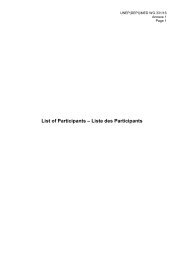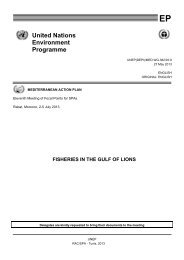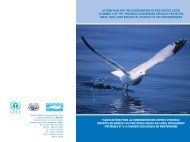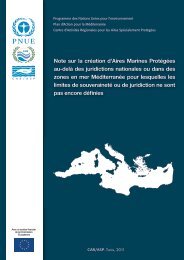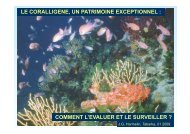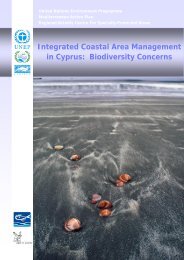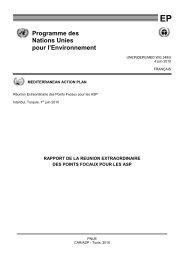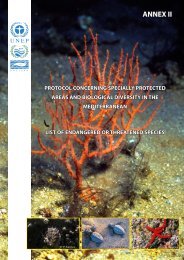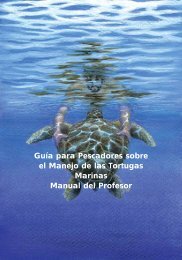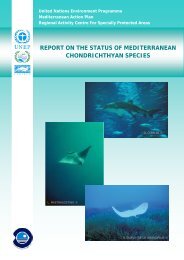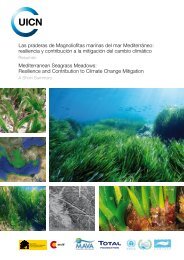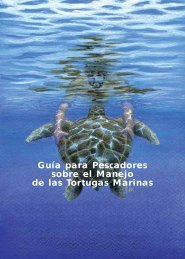Proceedings of the Second Mediterranean Symposium on Marine
Proceedings of the Second Mediterranean Symposium on Marine
Proceedings of the Second Mediterranean Symposium on Marine
Create successful ePaper yourself
Turn your PDF publications into a flip-book with our unique Google optimized e-Paper software.
THE SITUATION OF CAULERPA SPECIES AROUND TURKISH COASTS<br />
ükran CIRIK and Barıs AKÇALI<br />
Çanakkale 18 Mart University Faculty <str<strong>on</strong>g>of</str<strong>on</strong>g> Fisheries Terzioglu Campus 17100 Canakkale/TURKIYE<br />
cirik@comu.edu.tr<br />
ABSTRACT<br />
This paper is about <str<strong>on</strong>g>the</str<strong>on</strong>g> studies which have been d<strong>on</strong>e to find out <str<strong>on</strong>g>the</str<strong>on</strong>g> distributi<strong>on</strong> <str<strong>on</strong>g>of</str<strong>on</strong>g><br />
Caulerpa species around Turkish Coasts (Aegean and <str<strong>on</strong>g>Mediterranean</str<strong>on</strong>g>). With this project it<br />
was targeted to m<strong>on</strong>itor <str<strong>on</strong>g>the</str<strong>on</strong>g> invasi<strong>on</strong> <str<strong>on</strong>g>of</str<strong>on</strong>g> <str<strong>on</strong>g>the</str<strong>on</strong>g> Caulerpa species existing in <str<strong>on</strong>g>the</str<strong>on</strong>g><br />
<str<strong>on</strong>g>Mediterranean</str<strong>on</strong>g> coasts. During project, as well as <str<strong>on</strong>g>Mediterranean</str<strong>on</strong>g> endemic species such as<br />
Caulerpa prolifera and Caulerpa ollivieri, <str<strong>on</strong>g>the</str<strong>on</strong>g> Lessepsian species such as Caulerpa<br />
racemosa and its varieties (Caulerpa racemosa var. occidentalis, Caulerpa racemosa<br />
var. lamourouxii form. requenii), Caulerpa scalpelliformis were encountered.<br />
KEYWORDS: Invasive, Lessepsian, Caulerpa, <str<strong>on</strong>g>Mediterranean</str<strong>on</strong>g><br />
INTRODUCTION<br />
The <str<strong>on</strong>g>Mediterranean</str<strong>on</strong>g> Sea, where many civilisati<strong>on</strong>s evolved, is <str<strong>on</strong>g>the</str<strong>on</strong>g> most utilized and<br />
benefited sea by man. Coastal states <str<strong>on</strong>g>of</str<strong>on</strong>g> <str<strong>on</strong>g>the</str<strong>on</strong>g> <str<strong>on</strong>g>Mediterranean</str<strong>on</strong>g> Basin receive a share more<br />
than 70 % <str<strong>on</strong>g>of</str<strong>on</strong>g> <str<strong>on</strong>g>the</str<strong>on</strong>g> world tourism and have been bearing <str<strong>on</strong>g>the</str<strong>on</strong>g> most c<strong>on</strong>centrated human<br />
populati<strong>on</strong>. Especially <str<strong>on</strong>g>the</str<strong>on</strong>g> Anatolia and its coasts, due to its climatic, geological and biogeographical<br />
c<strong>on</strong>diti<strong>on</strong>s, show a c<strong>on</strong>tinent characteristics and bears as many species as<br />
that may occur in a c<strong>on</strong>tinent. <str<strong>on</strong>g>Mediterranean</str<strong>on</strong>g> Sea has a high biodiversity. A rough<br />
estimate <str<strong>on</strong>g>of</str<strong>on</strong>g> more than 8500 species <str<strong>on</strong>g>of</str<strong>on</strong>g> macroscopic marine organisms should live in <str<strong>on</strong>g>the</str<strong>on</strong>g><br />
<str<strong>on</strong>g>Mediterranean</str<strong>on</strong>g> Sea, corresp<strong>on</strong>ding to somewhat between 4% and 18% <str<strong>on</strong>g>of</str<strong>on</strong>g> world marine<br />
species (Bianchi & Morri, 2000).<br />
However, <str<strong>on</strong>g>the</str<strong>on</strong>g> list <str<strong>on</strong>g>of</str<strong>on</strong>g> exotic animals and plants that invaded <str<strong>on</strong>g>the</str<strong>on</strong>g> <str<strong>on</strong>g>Mediterranean</str<strong>on</strong>g> is getting<br />
l<strong>on</strong>ger everyday. Besides <str<strong>on</strong>g>the</str<strong>on</strong>g> afore-menti<strong>on</strong>ed Lessepsian migrati<strong>on</strong>s, species are<br />
intenti<strong>on</strong>ally or accidentally introduced into <str<strong>on</strong>g>the</str<strong>on</strong>g> <str<strong>on</strong>g>Mediterranean</str<strong>on</strong>g> via ship fouling, ballast<br />
waters, aquaculture, trade <str<strong>on</strong>g>of</str<strong>on</strong>g> living bait, wrapping <str<strong>on</strong>g>of</str<strong>on</strong>g> fresh seafood with living algae,<br />
aquariology and even scientific research (Bianchi & Morri, 2000). The last threat, invasi<strong>on</strong><br />
<str<strong>on</strong>g>of</str<strong>on</strong>g> <str<strong>on</strong>g>the</str<strong>on</strong>g> exotic species –in this case lessepsian migratory species –, after <str<strong>on</strong>g>the</str<strong>on</strong>g> opening <str<strong>on</strong>g>of</str<strong>on</strong>g><br />
<str<strong>on</strong>g>the</str<strong>on</strong>g> Channel has increasingly been observed al<strong>on</strong>g <str<strong>on</strong>g>the</str<strong>on</strong>g> Anatolian coasts. According to<br />
Boudouresque et al. (2002) <str<strong>on</strong>g>the</str<strong>on</strong>g>re might be 85 introduced species in <str<strong>on</strong>g>the</str<strong>on</strong>g> <str<strong>on</strong>g>Mediterranean</str<strong>on</strong>g>.<br />
At <str<strong>on</strong>g>the</str<strong>on</strong>g> Experts Working Group Meeting, organised by United Nati<strong>on</strong>s Envir<strong>on</strong>ment<br />
Programme in 1998, it was c<strong>on</strong>cluded that both Caulerpa racemosa, <strong>on</strong>e <str<strong>on</strong>g>of</str<strong>on</strong>g> <str<strong>on</strong>g>the</str<strong>on</strong>g><br />
lessepsian species originated from tropical sea and Caulerpa taxifolia, originated during<br />
ACTES DU DEUXIEME SYMPOSIUM MEDITERRANEEN SUR LA VEGETATION MARINE (ATHENES, 12-13 DECEMBRE 2003)<br />
83



